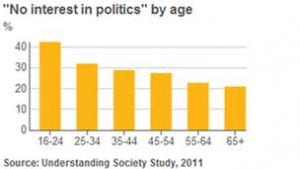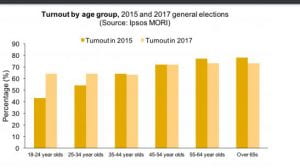Young people have found themselves feeling increasingly disconnected from politics with a decreasing interest in the political parties and their policies in the UK. The younger generation of voters has the lowest voter turnout across all of the different age groups who are eligible to vote in the UK elections and referendums. Elections are described as “the defining feature of the democratic process. They are the critical juncture where individuals take stock of their various political attitudes and preferences and transform them into a single vote choice.” (Dalton& Weldon, 2005) Individuals are given the opportunity to vote for the parties that they feel speak to them the most and the parties that have the most eye- catching policies. So why do young people have such a low voter turnout?
A widespread amount of young voters consider themselves to be invisible in the eyes of the government and the policy makers. This has formed the assumption that young people do not matter in the eyes of the government and therefore neither do their votes. The lack of effort made by political parties to engage younger voters can be seen through the minimal number of policies that are directed to them and primarily affect them. Young people are less likely to participate in politics if they feel as though their vote is not counting for anything that is of importance to them and are therefore more likely to “opt out of elections that do not engage them in the future.” (Martin, 2012)
This graph shows us that individuals between the ages of 16 and 24 found themselves to have the highest amount of people who had no interest in politics. The fact that young people are excluded from voting, until they reach the voting age means that they are less likely to educate themselves in politics until they reach the voting age where they can feel included. 16-24 year olds show the least amount of interest in politics because they are not adequately educated in politics in order for them to gain an interest and they are also not included in the government’s policy making to the extent that they should be.
If you did not know, the voting age in the UK is 16 years old and because of this there have been a number of arguments which claim that “16- and 17- year- olds are indeed less mature politically that older people: they are less interested in politics, less knowledgeable about political facts, their attitudes are less coherent and their attitudes are less stable over time.” (Barret& Pachi, 2019) Young voters are considered as unengaged and uninterested in politics and this tends to be linked to the voting age and how the age of I 16 is considered too young to vote. There are a number of arguments which disagree with the legal voting age in the UK and believe that young people should not have the power to make important decisions that can affect the nation. However, the opposing argument is that young voters are not less interested or less knowledgeable in politics, but that they show no interest because they feel excluded from the political system and therefore do not bother to educate themselves on the different political parties and their policies.
During the past couple of years, there has been an increase in participation by young voters in politics. This is due to the increase in use of the internet to deliver political views around the world. “Young people are largely alienated from, or at least feel dissatisfied with, traditional institutional forms of politics.” (Banaji& Buckingham, 2013) The internet and social media has allowed for political parties and politicians to directly connect with those who support them and increase political engagement between themselves and the public. Young people tend to be more active on social media and therefore are more likely to engage in political debates online. The use of social media apps such as Twitter has increased young people participation in politics as young people now have the opportunity to discuss and share their opinions with each other on these apps further widening their knowledge and interests in politics.
This is the link to a video of UK artist AJ Tracey on Twitter encouraging young people to register to vote and vote labour. https://twitter.com/i/status/869220809822187520
There has been a significant increase in the amount of young voters between the 2015 and 2017 general elections. In the 2015 election there was a 42% turnout of 18-24 year olds that voted. However, in the 2017 election there was a 65% turnout of 18-24 year olds that voted. These statistics prove that there has been an increase in political engagement by young people as there has been an increase in the amount of young people participating in the general elections.
The increase in participation by young people shows promising results for change. I definitely believe that if more young people can engage in politics and encourage others to do so too we can make a difference in the policies implemented that affect us and in creating change whereby we can put faith in a government that we can trust and feel close to.
Bibliography
Dalton, R, J. Weldon, S. (2005). Is the Party Over? Spreading Antipathy Towards Political Parties.
Barret, M, D. Pachi, D. (2019). Macro Contextual Factors Linked to Youth Civic and Political Engagement. In: Youth Civic and Political Engagement. New York: Routledge.
Martin, A, J. (2012). Young People and Politics: Political Engagement in the Anglo- American Democracies. New York. Routledge.
Banaji, S. Buckingham, D. (2013). The Civic Web: Young People, the Internet and Civic Participation. Cambridge. MIT Press.

